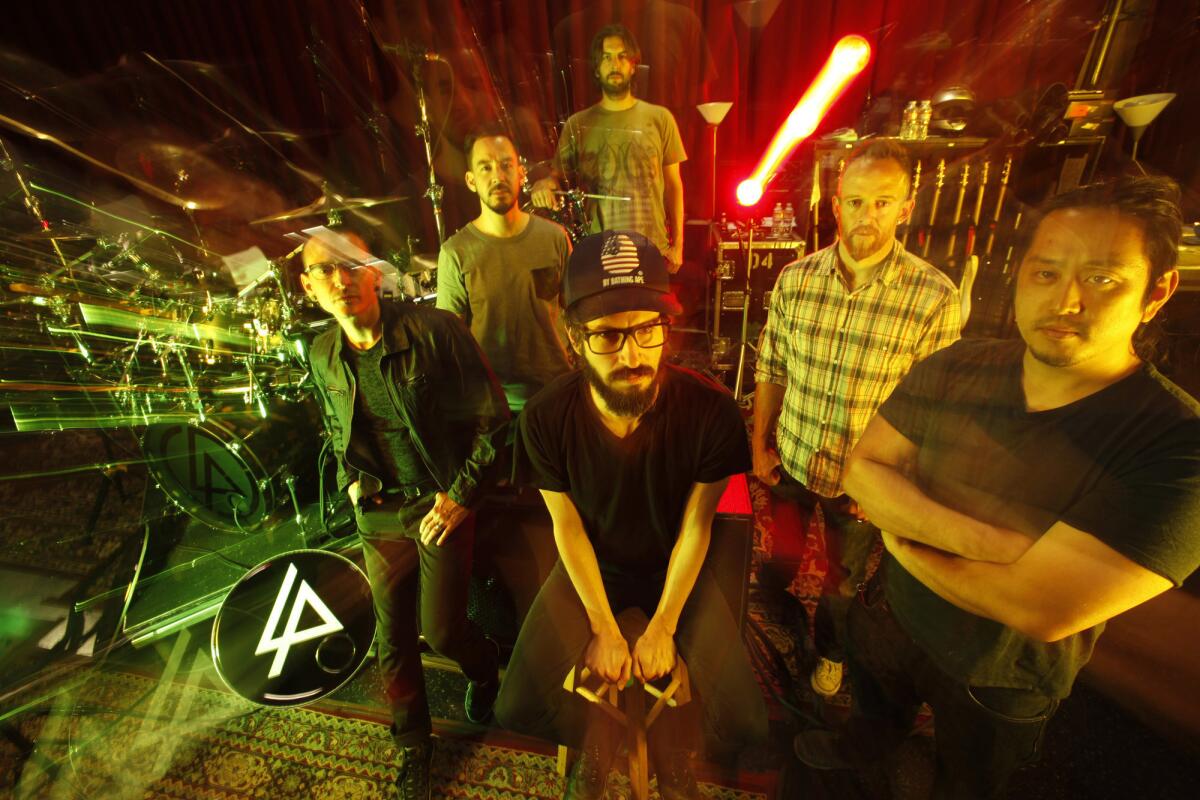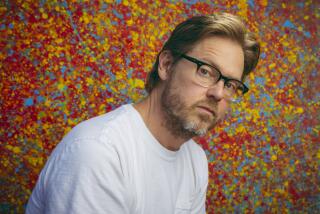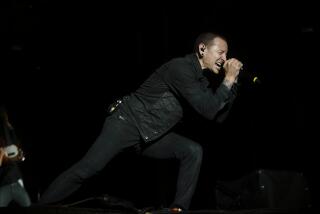Linkin Park comes screaming back with ‘Hunting Party’

Before Linkin Park’s latest album was born, a different Linkin Park album died.
It happened not long after Mike Shinoda, the Los Angeles band’s creative mastermind, began building songs for the follow-up to 2012’s “Living Things.” Like that record, the new music was thoughtful, melodic, full of detailed electronic textures — in keeping, basically, with the sound of the many young alternative rock acts that Linkin Park once inspired.
“And there was a day when I listened to it and thought, ‘Oh my God,’ ” Shinoda recalled recently. “I like to listen to this type of music, but there’s too much of it out there, and I don’t want to get lost in the oceans of it.”
He was sitting in a North Hollywood recording studio and tapped the mixing console for emphasis. “Meanwhile, there’s this other thing that I want, and it’s not being fed by anybody. So that’s what I need to do.”
Shinoda, one of the group’s two vocalists along with Chester Bennington, promptly scrapped the demos he’d been working on and started again, channeling influences he hadn’t called on since Linkin Park’s early days: Helmet, Minor Threat, the Swedish punk band Refused. He decided to record to tape rather than with digital software and to concentrate on performances rather than post-production editing.
“I told the guys in the band, ‘We need to weed out anything that doesn’t feel direct and visceral,’ ” Shinoda said. “This record had to be raw as hell.”
The result, released Tuesday, is “The Hunting Party,” Linkin Park’s sixth studio album and its most aggressive in years, with fuzzy guitars, breakneck tempos and as much screaming as singing.
Produced by Shinoda and guitarist Brad Delson (following the band’s lengthy stint with Rick Rubin), it marks an unexpected — and possibly risky — shift for a group whose early hits did as much as any to pave the way for Imagine Dragons and Bastille, to name two inheritors that have found commercial success with a softer-edged version of Linkin Park’s synthed-up rock.
“They were just in the mood to do something heavy again,” said Daron Malakian of System of a Down, who co-wrote and played guitar on “Rebellion.” (Other guests on the album include Tom Morello of Rage Against the Machine and Helmet’s Page Hamilton.)
“For a couple of records they went off and did something different,” Malakian went on, referring to “Living Things” and its spacey 2010 predecessor, “A Thousand Suns.” “But I think they were trying to make something that connected with the harder audience that was their first fanbase to begin with.”
That fanbase — which drove sales of Linkin Park’s 2000 debut, “Hybrid Theory,” to sales of more than 10 million copies — has been neglected of late, according to Bennington.
“We see a void,” the singer said, in which listeners are being inundated with “safety rock sold as edgy alternative music.” As an example, Bennington sang the high-pitched acoustic-guitar riff from Imagine Dragons’ “It’s Time.”
Where’s the chutzpah in that? he asked, albeit using an unprintable word for part of the male anatomy.
There’s no disagreeing with Bennington’s point about a void: Hard rock has never been less relevant to the larger musical conversation than it is right now, with only a handful of bands — Queens of the Stone Age, Tool, Foo Fighters — making records that attract even a fraction of the attention that Beyonce’s and Luke Bryan’s get.
Yet Linkin Park’s return to a more vigorous sound might also have been motivated by the recognition that it was beginning to flail. The band’s previous two albums sold far fewer copies than its early albums, while “Living Things” in particular seemed to lack the energy that used to define its music.
Shinoda acknowledged that the group’s recent work may not be among its best.
“‘Living Things’ was a very careful balance of sonic elements,” he said, referring to traces of pop and dance music. “But looking back, I’d say if we’d gone any further in that direction I would’ve been bummed out.”
Still, Shinoda insisted that “The Hunting Party” was not a product of business savvy — the band’s attempt to exploit an underserved market — but of its determination to follow a creative impulse. Indeed, he described consulting Linkin Park’s management for advice on the commercial viability of an aggressive rock album in 2014 and said he was told it was hardly a sure thing.
“I’m eager to see how the record does in its first week,” said Lisa Worden, music director at L.A.’s influential modern-rock station KROQ-FM (106.7). “I think that our male listeners are going to dig it, but it’s a little early for me to really know what we have.”
Like any major-label act with a big-budget project to sell, Linkin Park isn’t leaving the album’s reception to chance.
On Tuesday the band played a KROQ-sponsored show, live-streamed online, at the so-called Red Bull Sound Space in Culver City. The next evening it performed again, this time for broadcast on terrestrial radio from Clear Channel’s iHeartRadio Theater. And it’s set to tour North America this year with Thirty Seconds to Mars, known by many for its Oscar-winning movie-star frontman, Jared Leto. (They’ll hit the Hollywood Bowl on Sept. 15.)
But how the album fares is less important than what it represents, Shinoda said.
“There are definitely people who think Linkin Park is uncool,” he said with a laugh. “But I’ve always thought there’s something OK — if not awesome — about being on the outside of things. And by making an album like this now, I think I’m standing behind that.”
Twitter: @mikaelwood
More to Read
The biggest entertainment stories
Get our big stories about Hollywood, film, television, music, arts, culture and more right in your inbox as soon as they publish.
You may occasionally receive promotional content from the Los Angeles Times.











